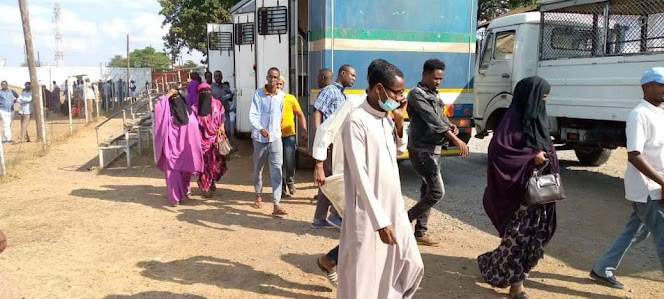By Derrick Silimina
Since his early high school days, Sean Brown’s immense strength in arithmetic and science subjects has made a career in engineering an obvious choice.
Coming from a humble background, 18-year-old Brown knows that hard work always pays and embracing a vision anchored on academic excellence usually opens numerous opportunities in life.
“I developed a passion for mechanics in my early childhood. After high school, my dream came true when I enrolled to study engineering so that I could contribute to the development of the sector,” Brown told ChinAfrica.
Brown is upbeat that as a mechanical engineering student at Northern Technical College (NORTEC) in Ndola of Copperbelt Province, his qualification will remain a prized asset in Zambia as the Southern African country charts a new economic pathway.
Brown and his two friends represented NORTEC at the prestigious Africa Technology Challenge (ATC) contest sponsored by Chinese company AVIC International.
Encouraging creativity
In a bid to support development of technological talents in Africa, AVIC International launched the ATC in June 2014 and sponsored ATC Season VII in 2022 to award the African students who emerged as winners of the contest.
A corporate social responsibility youth empowerment project of AVIC International, ATC is aimed at identifying skills among the youth through training and competitions focused on the rapidly developing construction industry, particularly in computer-aided design, which involves reading and designing architectural drawings.
The ATC contest has thus far been held seven times. Under the theme Limitless Innovation, which emphasises harnessing technology to push the boundaries of creativity, the 2022 contest, held in Kenya, attracted a total of over 230 engineering students from Kenya, Uganda, Ghana, Egypt, Zambia and Zimbabwe, who were trained and certified in the reading and drafting of construction drawings.
Diana Busingye of Uganda bagged the first place in the individual category. She said that ATC was a rewarding contest because it built her skills in making designs for the construction sector.
“My secret of success during the contest was extensive reading as well as listening to my instructors,” said 24-year-old Busingye, who is pursuing a civil engineering degree at the Luyanzi Institute of Technology of Uganda, and was awarded a scholarship to study in China.
Sean Brown, a student from NORTEC, was also awarded a scholarship to study architectural design in China after emerging as one of the three outstanding participants at the event.
“During the contest, I learnt how to use Chinese software for technical drawing which is very simple and friendly even for inexperienced students.”
AVIC International Project Engineering Co. Vice President Xu Fei disclosed that the Chinese firm has so far trained 960 students from 10 countries, and as a result, nine institutions were awarded design orders amounting to $500,000.
Skills development
Xu emphasised that the experience gained by AVIC International places it in a very unique position to collaborate with African governments to build technical, vocational education and training (TVET) capacity through the construction and upgrading of the colleges as well as the capacity building of their staff.
Alex Simumba, director for vocational education and training at Zambia’s Ministry of Technology and Science, said the competition was a great platform for Zambian students, adding the country’s participation in such high-level competitions is in line with the government’s focus on making TVET a means of livelihood for the youth and the huge investment it has made in the state-of-the-art equipment in technical colleges.
NORTEC Acting Principal Martin Kasonso said the win was a plus for the institution as it would help to position the college as a centre for national competitions by building capacity through various upgrades to enable NORTEC to meet the international standards that are required to hold such international competitions.
“Such competitions would help NORTEC in coordinating with other engineering institutions to allow students to demonstrate their skills in different ways and help to position the college both at regional and international level,” Kasonso added.
During the seventh edition of the ATC, NORTEC was the only higher learning institution representing Zambia in the young engineer’s contest after beating other technical institutions at national level. As a result, the Zambian team has been certified in reading and drafting of construction drawings.
On the other hand, Ezekiel Machogu, cabinet secretary for the Ministry of Education of Kenya, said the East African country supports the ATC because it is a vehicle for raising awareness and enlightening students about various opportunities that may come from skills development.
“The ATC affirms Kenya’s belief that instilling technological skills in our youth is the key to spurring our country to progress and prosperity,” Machogu said during a recent ATC event co-organised by AVIC International and Kenya’s Ministry of Education in Nairobi.
Meanwhile, Zhou Meifen, cultural counsellor at the Chinese Embassy in Kenya, said that the ATC involves skills training and practical knowledge transfer and aims to improve the youth’s technical skills through training and competition as a way of reducing unemployment in Kenya and the rest of Africa.
AVIC International has upgraded 144 vocational training institutions across Kenya and trained 1,500 teachers and over 50,000 students as well as support staff.
The projects included constructing “three accesses and one levelling” (access to water, electricity and road, and levelled ground), campsite construction, and equipment relocation.
It has also helped to repair and upgrade damaged local roads, build water conservancy facilities, share clean water sources with the community, and renovate and construct school buildings and other community facilities for free.
Other China-based companies that are actively engaged in corporate social responsibility projects in Africa include China Resources, which tops the list measuring Chinese companies by social responsibility, followed by China Huadian Corp., and Sinopec Group, according to a recent report recently released by the Chinese Academy of Social Sciences.
Reporting from Zambia










